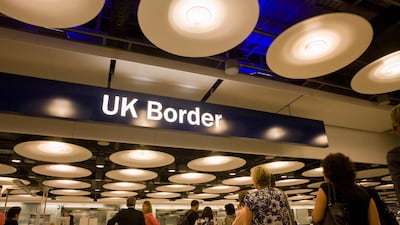UK visa holders have complained of difficulties entering the country because of problems accessing the new digital visa system.
The scheme is supposed to link to a person’s passport and prove their right to remain in the country. However, many travellers have struggled to board flights to Britain because they could not access the digital platform to prove their immigration status.
Travellers should be able to open a secure "share code" at the airport, however, some have found that it has not operated correctly on arrival. The new system was introduced at the start of the year having been delayed by three months due to IT issues.
Most physical cards, known as biometric residence permits, expired by December 31, but people were told to hold on to them to use in the meantime. The government’s website crashed on New Year during a last-minute rush to apply for the eVisa.
Open Rights Group, which claims to be the UK's largest grassroots digital rights campaigning organisation, has warned people are at risk of "becoming undocumented due to system errors". Sara Alsherif, a migrant rights programme manager with Open rights, said the delays to the rollout had not solved the problems.
"Imagine that every time you leave the UK you are worried that you won't be let back in," she said. "Not because you don't have the right to be in the UK but because there might be an internet outage or technical glitches when you show your eVisa to international carriers. You have to hope there are no problems with the Home Office database so the correct information is called."
She said the Home Office takes no responsibility even when it's their system that fails, meaning people can find themselves stuck at an airport until it is sorted out. She suggested a QR code could be used which can be saved to your phone or printed out. "This simple change could at least reduce the risk of people being stranded outside the UK."
One eVisa holder, writing on X, said she came close to being refused permission to board a plane until she managed to access her right to work page with her photo. Even then, “the internet was so bad that I almost couldn’t pull it up”, she said.
“The overseas desks are aware of the change but some have no capacity to actually view the visa so they ask for a hard copy. There is no downloadable hard copy so some printouts don’t look legitimate. It is very stressful and I highly recommend printing out something before you travel."
About 4 million people are entitled to have the eVisa and more than 3.13 million online access accounts have been created so far. One woman had to buy another ticket for more than £750 after being refused permission to fly to the UK by an airline in Brazil on December 28 because her biometric residence permit was about to expire. She told The Independent the experience was “horrible”, adding: “I couldn’t breathe, I nearly collapsed.”
She said she was asked for her passport and residence permit card again while she was waiting to board and was told her information was not right in the system. She rebooked on a different airline days later and had no problems travelling the second time.
The 3 Million, a pressure group that campaigns for the rights of EU citizens living in the UK, said it has produced an information card for residence holders “to show to airlines, landlords, employers, or anyone else you need to prove your status to”.
“This card is relevant to all migrants, especially people whose BRPs and BRCs expire on 31 December and who haven't had rely on their eVisa to travel,” the group wrote on X. “Airlines and other carriers are also obligated to allow people to board with expired documents until at least 31 March 2025.”
In a statement shared with The National, a Home Office spokeswoman said the government was working to ensure the rollout of eVisas is “smooth”.
“We are listening to concerns people might have and are working closely with carriers and international stakeholders to ensure the rollout of eVisas is smooth,” she said. “eVisas bring significant benefits. They cannot be lost, stolen, or tampered with, unlike a physical document, and also increase the UK immigration system’s security and efficiency.”


